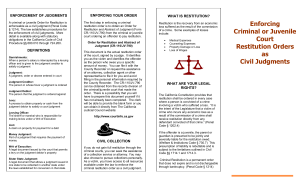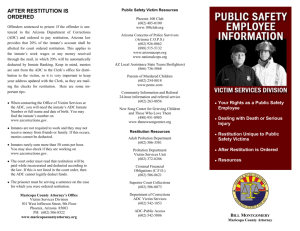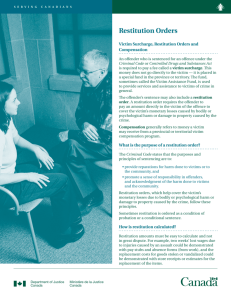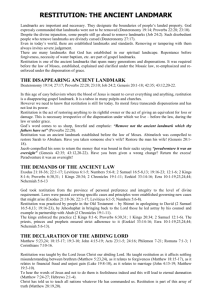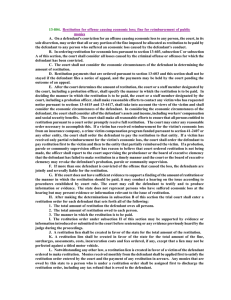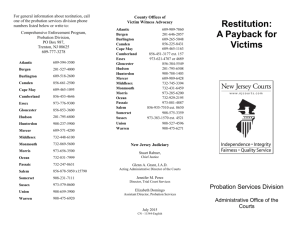collecting restitution - IOSCO County Michigan
advertisement
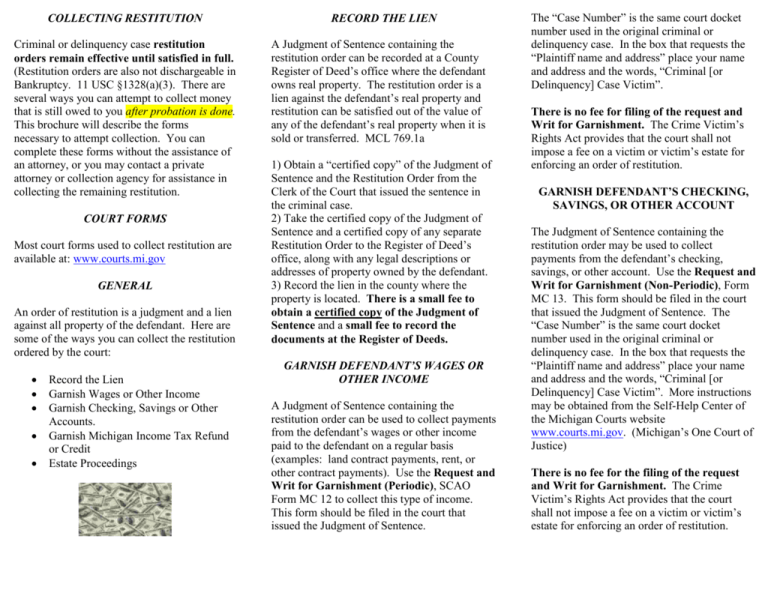
COLLECTING RESTITUTION Criminal or delinquency case restitution orders remain effective until satisfied in full. (Restitution orders are also not dischargeable in Bankruptcy. 11 USC §1328(a)(3). There are several ways you can attempt to collect money that is still owed to you after probation is done. This brochure will describe the forms necessary to attempt collection. You can complete these forms without the assistance of an attorney, or you may contact a private attorney or collection agency for assistance in collecting the remaining restitution. COURT FORMS Most court forms used to collect restitution are available at: www.courts.mi.gov GENERAL An order of restitution is a judgment and a lien against all property of the defendant. Here are some of the ways you can collect the restitution ordered by the court: Record the Lien Garnish Wages or Other Income Garnish Checking, Savings or Other Accounts. Garnish Michigan Income Tax Refund or Credit Estate Proceedings RECORD THE LIEN A Judgment of Sentence containing the restitution order can be recorded at a County Register of Deed’s office where the defendant owns real property. The restitution order is a lien against the defendant’s real property and restitution can be satisfied out of the value of any of the defendant’s real property when it is sold or transferred. MCL 769.1a 1) Obtain a “certified copy” of the Judgment of Sentence and the Restitution Order from the Clerk of the Court that issued the sentence in the criminal case. 2) Take the certified copy of the Judgment of Sentence and a certified copy of any separate Restitution Order to the Register of Deed’s office, along with any legal descriptions or addresses of property owned by the defendant. 3) Record the lien in the county where the property is located. There is a small fee to obtain a certified copy of the Judgment of Sentence and a small fee to record the documents at the Register of Deeds. GARNISH DEFENDANT’S WAGES OR OTHER INCOME A Judgment of Sentence containing the restitution order can be used to collect payments from the defendant’s wages or other income paid to the defendant on a regular basis (examples: land contract payments, rent, or other contract payments). Use the Request and Writ for Garnishment (Periodic), SCAO Form MC 12 to collect this type of income. This form should be filed in the court that issued the Judgment of Sentence. The “Case Number” is the same court docket number used in the original criminal or delinquency case. In the box that requests the “Plaintiff name and address” place your name and address and the words, “Criminal [or Delinquency] Case Victim”. There is no fee for filing of the request and Writ for Garnishment. The Crime Victim’s Rights Act provides that the court shall not impose a fee on a victim or victim’s estate for enforcing an order of restitution. GARNISH DEFENDANT’S CHECKING, SAVINGS, OR OTHER ACCOUNT The Judgment of Sentence containing the restitution order may be used to collect payments from the defendant’s checking, savings, or other account. Use the Request and Writ for Garnishment (Non-Periodic), Form MC 13. This form should be filed in the court that issued the Judgment of Sentence. The “Case Number” is the same court docket number used in the original criminal or delinquency case. In the box that requests the “Plaintiff name and address” place your name and address and the words, “Criminal [or Delinquency] Case Victim”. More instructions may be obtained from the Self-Help Center of the Michigan Courts website www.courts.mi.gov. (Michigan’s One Court of Justice) There is no fee for the filing of the request and Writ for Garnishment. The Crime Victim’s Rights Act provides that the court shall not impose a fee on a victim or victim’s estate for enforcing an order of restitution. GARNISH DEFENDANT’S MICHIGAN INCOME TAX REFUND or CREDIT The Judgment of Sentence containing the restitution order may be used to collect payments from the defendant’s income tax refund or credit if there is one available. Use the Request and Writ for Garnishment (Income Tax/Credit), Form MC 52. This form should be filed in the court that issued the Judgment of Sentence. The “Case Number” is the same court docket number used in the original criminal or delinquency case. In the box that requests the “Plaintiff name and address” place your name and address and the words, “Criminal [or Delinquency] Case Victim”. More instruction may be obtained from the Self-Help Center of the Michigan Courts website, www.courts.mi.gov. (Michigan’s One Court of Justice) You may only garnish the defendant’s Michigan Income Tax Refund or Credit with this form. You may not garnish the defendant’s Federal or Local Income Tax Refund or Credit. Form MC 52 may be used each year until the restitution is fully paid. There is no fee for the filing of the Request and Writ for Garnishment. The Crime Victim’s Rights Act provides that the court shall not impose a fee on a victim or victim’s estate for enforcing an order of restitution. MCL 780.766(20). To do this, file a Statement and Proof of Claim, Form PC579 in the Probate Court of the county in which the defendant died. The form is available at the Probate Court or on Iosco County Prosecutor’s website. HAVING PROBLEMS COLLECTING YOUR RESTITUTION ON-LINE HELP! See the forms available at website, www.iosco.m33access.com/prosecutor.htm for restitution recovery forms, MC12, MC13, MC52 and PC 579 for garnishment to satisfy restitution orders. NOTE: These instructions are designed to help you begin to collect the remainder of restitution owed to you; they are not necessarily complete instructions for each and every collection question that may arise. Please consult with a private attorney if you have further questions. NICHOL J. PALUMBO Iosco County Prosecutor 422 Lake St., P.O. Box 548 Tawas City, MI 48763 (989)362-6141 FAX: (989)984-1106 ESTATE PROCEEDINGS Remember that the restitution order remains in effect until it is fully satisfied. This means that the restitution may be collected from the assets of the defendant’s estate after his or her death. Christine Roulo, Victim Advocate (989)984-1041


